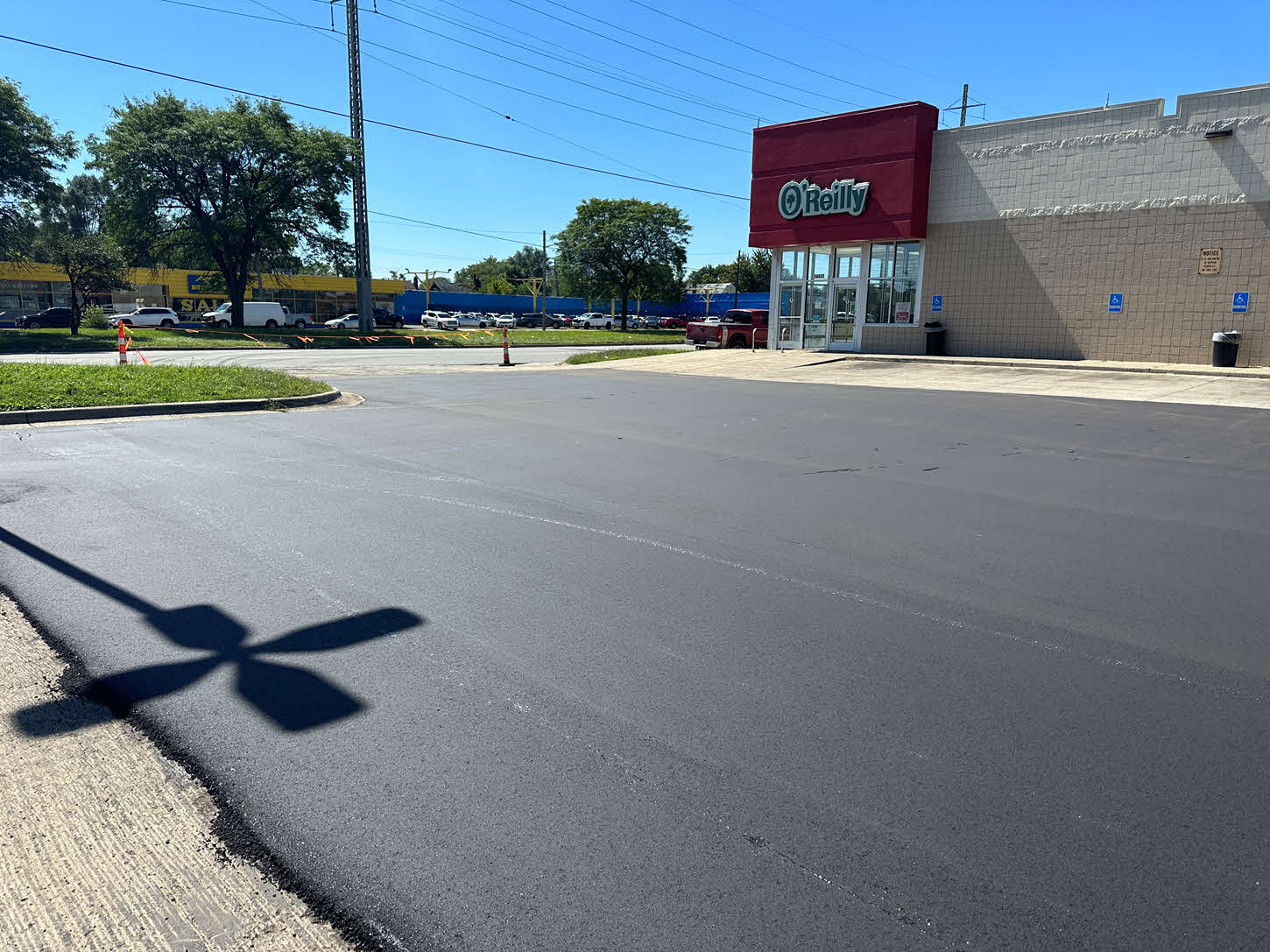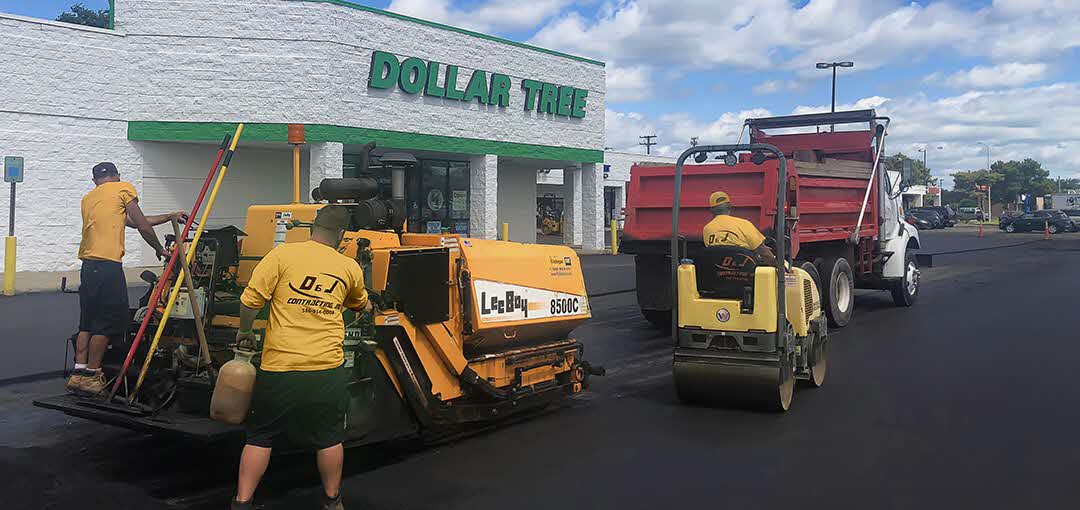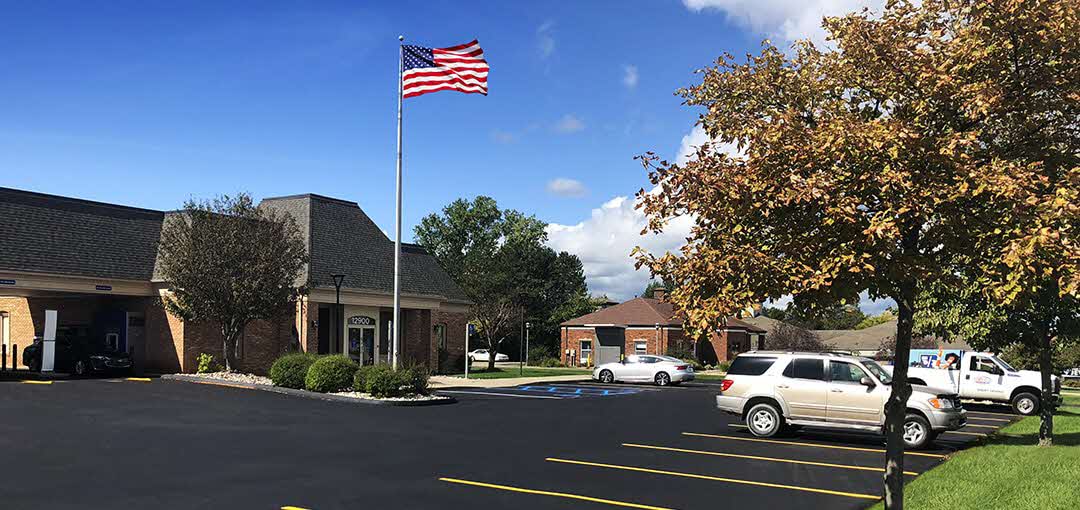Parking Lot Repaving inShelby, MI
Professional Parking Lot Repaving for a Fresh, Smooth Finish
We Are Locally Owned & Operated For Over 37 Years
Contact Us Today!
We Serve Businesses In And Around The Following Cities:
About Parking Lot Repaving
Comprehensive Guide to Parking Lot Repaving in Shelby
Understanding the Necessity of Parking Lot Repaving
In the bustling city of Shelby, where commercial activity is the lifeblood of its economic pulse, maintaining infrastructure is crucial. Among the most significant aspects of this maintenance is the repaving of parking lots for commercial properties. Parking lots serve as the first physical impression customers have of a business. If these areas are neglected, it could unintentionally suggest a lack of attention to detail that might translate to how business is conducted. Thus, regular parking lot repaving is not merely a cosmetic update; it’s a strategic investment.
Understanding why parking lot repaving is so essential requires a look at multiple factors. During Shelby’s blistering summers and chilly winters, parking lot surfaces endure significant environmental stress. Temperature fluctuations can wreak havoc on asphalt surfaces, leading to cracks and potholes. The steady increase in commercial traffic further exacerbates this wear and tear, making repaving a necessary measure to ensure safety and functionality.
In addition to environmental and traffic-induced damage, repaving offers an opportunity to reevaluate and enhance the design of a parking space. Aligning with city regulations and optimizing for the best possible traffic flow and safety measures can transform an ordinary parking lot into a well-oiled machine, catering effectively to both client needs and local business operations.
The Process of Parking Lot Repaving
The process of repaving a parking lot is intricately detailed and involves several carefully orchestrated steps. It begins with a comprehensive assessment of the existing conditions. Professionals, such as those from D&J Contracting, conduct a thorough evaluation to determine the extent of surface damage and underlying structural integrity. This initial evaluation allows for a precise estimation of the parking lot repaving cost, providing commercial property owners with a clear understanding of the necessary investment.
Following this assessment, planning is crucial. Detailed maps are generated, aligning with local codes and ensuring optimal traffic patterns. The preparation phase involves removing the damaged asphalt layer and addressing any underlying issues like drainage problems. Drainage is a significant aspect often overlooked, yet it plays a vital role in prolonging the life of the pavement by preventing water accumulation, which can accelerate degradation.
After preparing the subsurface, the new layer of asphalt is applied with precision. This stage involves using high-quality materials and equipment to ensure longevity and durability. Experienced contractors know that the application technique is as important as the materials used. Ensuring the asphalt is evenly distributed and compacted can prevent future issues like cracking or shifting.
Once the asphalt is laid, it requires time to set and cure properly. This crucial downtime must be factored into any project to avoid premature usage that could compromise the integrity of the new surface. Upon completion, the lot is marked with clear lines, designated parking spaces, directional arrows, and other necessary road markings to ensure safety and order.
The Economic and Practical Benefits
Investing in the repaving of a parking lot offers substantial benefits that go beyond aesthetics. A freshly repaved lot enhances a business’s curb appeal, making the establishment more inviting to potential customers. In commercial real estate, first impressions are invaluable. The polished appearance of a well-maintained lot can distinguish a business from its competitors, especially in a city like Shelby, where numerous options are available to consumers.
The structural integrity of a repaved parking space also plays a pivotal role in reducing liability risks. Cracked pavements and potholes are not only an inconvenience; they pose safety risks that could lead to accidents. Ensuring a smooth, hazard-free surface minimizes the potential for incidents, which can otherwise result in hefty liability claims. This, in turn, can lead to better insurance rates for businesses, further showing how repaving is a financially prudent decision.
In the broader scope, a new parking lot is an investment in the property’s value. Should the business decide to sell or lease their property, a well-maintained lot could significantly increase its marketability and valuation. Beyond individual business benefits, routine repaving contributes positively to the community’s overall infrastructure, reflecting an area that is well-cared-for and economically thriving.
Implementing Sustainable Practices
In our modern age, sustainability is becoming an increasingly vital consideration in commercial property maintenance. When approaching parking lot repaving in the bustling environment of Shelby, it is crucial to consider sustainable practices. Many forward-thinking contractors, including D&J Contracting, integrate eco-friendly processes into their projects, thus ensuring minimal environmental impact.
Sustainable repaving practices might include using recycled materials, which not only reduces waste but can also lower costs. Efficient energy usage and low-emission machinery further contribute to environmentally friendly operations. The choice of materials can significantly impact both the environment and the longevity of the parking lot surface. For instance, certain types of asphalt are specifically designed to withstand extreme temperatures, effectively reducing the need for frequent repaving due to climate-induced deterioration.
These sustainable practices ensure that while immediate goals of improved appearance and functionality are met, the long-term footprint of such projects is also minimized. This is paramount, as commercial properties increasingly gear their operations towards environmentally conscious models.
Real-World Applications and Businesses Reaping the Benefits
In Shelby, several businesses have successfully harnessed the benefits of parking lot repaving. For instance, a popular shopping plaza in the heart of the city underwent a comprehensive repaving project to address long-standing wear and tear. The upgrade not only enhanced the safety and appearance of the lot but also accommodated an increase in customer volume. The improved parking lot contributed to a 20% increase in foot traffic, highlighting the direct correlation between infrastructure investment and retail success.
Another notable example involves a local office complex that undertook a repaving project to address drainage issues. The drainage adjustments made during the repaving process have drastically reduced water pooling – a prior nuisance – thereby lowering long-term maintenance costs and significantly reducing their annual water damage repair budget.
Businesses like these set the benchmark in illustrating that such investments yield substantial returns. This isn’t just about immediate improvement; it’s about fostering enduring value, both for the property itself and the community at large.
The seamless execution of these projects is often attributed to skilled contractors who understand the nuances of parking lot dynamics. D&J Contracting has gained a reputation within Shelby for their expert handling of such projects, consistently delivering results that meet business objectives while staying attuned to client schedules and budget constraints.
Through these practical case studies, it becomes evident how strategic investments in infrastructure improvements directly translate to broader business success. Parking lot repaving emerges not as a periodic necessity but an avenue for growth and development, sparking a positive cycle of economic enhancement and community uplift.
Ultimately, the value of parking lot repaving in Shelby for commercial properties proves vast and significant. A strategic approach to repaving ensures that businesses can bolster their presence, enhance the value of their properties, and create safer environments for everyone involved. The city stands to benefit greatly from widespread adoption of these practices, leading to an improved urban landscape that attracts business and fosters a flourishing community.
Parking Lot Repaving Gallery


Call Us Today to receive your Free Quote for
Parking Lot Repaving in Shelby
Serving: Shelby, US

About Shelby, US
Shelby Township was set off by an act of the Michigan Territorial Legislature on April 12, 1827, and a civil government was organized the following May. It originally included the area that is now Sterling Heights, which was set off March 17, 1835, as the township of Jefferson, renamed to Sterling on March 6, 1838. Utica, located on the southern edge of the township, originally incorporated as a village on March 9, 1838, although that corporation was dissolved soon afterwards. The village was incorporated for a second time on May 10, 1877.
The village of Disco (42°41′02″N 83°02′04″W / 42.68389°N 83.03444°W) was located at what is now the junction of 24 Mile Road and Van Dyke Road. and was platted in 1849. The community never incorporated, although the local high school, the Disco Academy, gained some local recognition and a post office named Disco operated from May 5, 1854, until July 31, 1906. Only a few homes and a namesake on old county road maps remain of this now forgotten historic place. See also: “The Lost Village of Disco” on the Shelby Township Historical Society website.
Shelby Township is in western Macomb County and is bordered to the west by the cities of Rochester and Rochester Hills in Oakland County. The cities of Utica and Sterling Heights border the township to the south. Mount Clemens, the Macomb county seat, is 11 miles (18 km) to the southeast, and downtown Detroit is 24 miles (39 km) to the south.
According to the United States Census Bureau, the township has a total area of 35.2 square miles (91 km), of which 34.4 square miles (89 km) are land and 0.8 square miles (2.1 km), or 2.31%, are water. The township is drained by the Clinton River, a tributary of Lake St. Clair.
There are no incorporated villages and four unincorporated communities:
- Preston Corners is located at the corner of 25 Mile and Schoenherr roads at 42°41′58″N 82°59′45″W / 42.69944°N 82.99583°W. Ira and Deborah Preston bought 400 acres (1.6 km) of land from the United States government in 1826 and settled on it the following year, later building a sawmill and a picket fence factory.
- Shelby is located at Shelby and 25 Mile Roads (42°41′51″N 83°04′10″W / 42.69750°N 83.06944°W).
- Shelby Village is located where Auburn and Ryan roads intersect. Housing was built in this area in the 1940s.
- Yates is on the boundary with Rochester and Rochester Hills, Oakland County (42°40′25″N 83°05′45″W / 42.67361°N 83.09583°W ; Elevation: 669 ft./204 m.).
As of the census of 2010, there were 73,804 people, 28,299 households, and 17,923 families living in the township. The racial makeup of the township was 89.4% White, 3.1% African American, 3.3% Asian, 0.3% from other races, and 1.5% from two or more races. Hispanic or Latino of any race were 2.4% of the population.
The U.S. Census Bureau defined Shelby Charter Township as a census-designated place (CDP) in the 2000 Census so that the community would appear on the list of places (like cities and villages) as well on the list of county subdivisions (like other townships). The final statistics for the township and the CDP were identical. As of the census of 2000, there were 65,159 people, 24,486 households, and 17,923 families living in the township. The population density was 1,878.7 inhabitants per square mile (725.4/km). There were 25,265 housing units at an average density of 728.5 per square mile (281.3/km). The racial makeup of the township was 94.95% White, 0.85% African American, 0.24% Native American, 2.11% Asian, 0.02% Pacific Islander, 0.45% from other races, and 1.38% from two or more races. Hispanic or Latino of any race were 1.71% of the population.
There were 24,486 households, out of which 33.7% had children under the age of 18 living with them, 62.6% were married couples living together, 7.3% had a female householder with no husband present, and 26.8% were non-families. 21.6% of all households were made up of individuals, and 6.6% had someone living alone who was 65 years of age or older. The average household size was 2.65 and the average family size was 3.13.
In the township the population dispersal was 24.9% under the age of 18, 8.5% from 18 to 24, 31.0% from 25 to 44, 25.1% from 45 to 64, and 10.5% who were 65 years of age or older. The median age was 37 years. For every 100 females, there were 99.6 males. For every 100 females age 18 and over, there were 97.7 males.
The median income for a household in the township was $65,291, and the median income for a family was $76,312. Males had a median income of $59,380 versus $33,844 for females. The per capita income for the township was $30,131. About 2.7% of families and 3.7% of the population were below the poverty line, including 4.1% of those under age 18 and 5.1% of those age 65 or over.
Shelby Charter Township has a Supervisor-Board style township government with elected supervisor, clerk, treasurer and four trustees. The Township operates the Shelby Township Library as well as Cherry Creek Golf Course.
The majority of residents are zoned into Utica Community Schools, which serves parts of the communities of Sterling Heights, Macomb Township, Washington Township, and Ray Township, as well as most of Shelby Charter Township, and all of Utica. However, a small number of residents are zoned into Romeo Community Schools.
Call Us Today to receive your Free Quote for
Parking Lot Repaving in Shelby
Related Services in Shelby, US
We Serve Businesses In The Following Zip Codes:
48007, 48015, 48021, 48026, 48035, 48036, 48038, 48042, 48043, 48044, 48045, 48046, 48047, 48048, 48050, 48051, 48066, 48071, 48080, 48081, 48082, 48083, 48084, 48085, 48088, 48089, 48090, 48091, 48092, 48093, 48098, 48099, 48225, 48230, 48236, 48310, 48311, 48312, 48313, 48314, 48315, 48316, 48317, 48318, 48397